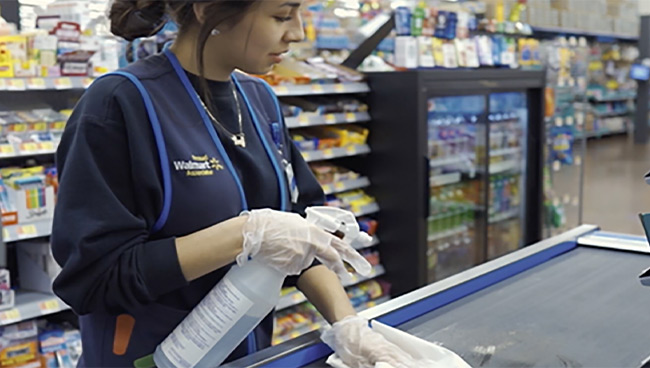BY SARAH MAHONEY // Media Post, April 3, 2020
Much of the COVID-19 crisis has focused on retailer behavior. There’s the good: Opening an hour early, just for seniors! The bad: Forcing employees to work without protective gear! And mostly, there’s a vast in-between, with stores serving customers in a climate where every transaction poses a potentially fatal risk.
Marketing Daily checks in with Wendy Liebmann, CEO and chief shopper at WSL Strategic Retail, for insights on how this behavior — especially from employers — is reshaping brand perception.
“As we saw following 9/11, this stepped-up appreciation for others — grocery workers, nurses, doctors, first responders — will stick. In highly emotional times, people are judged on a different, expanded set of values. This isn’t short-term. A year from now, people will be looking around and saying, “Is this a store I want to shop in?” –Wendy Liebmann
Marketing Daily: Consumers have typically been pretty oblivious to retailers’ employment reputation, even as they’ve stepped up awareness of sustainability efforts. With grocery stores the focus of so much COVID-19 attention, is that changing?
Wendy Liebmann: Yes, absolutely. To me, this is a big pivot. For 10 years now, we’ve been rating retailers on their “Caring” scores: how much consumers believe these companies have their best health and wellness interests at heart.
It’s worth noting that retailers as a whole do very poorly. Only two — Aldi and Costco — have more than 50% saying they care about consumers. We think people’s perceptions of how they treat employees are just as important, and that those perceptions will endure beyond this crisis.
MD: Why?
Liebmann: Caring has become part of the overall value proposition. I’ve got so many places I could shop. I may shop at a place that I feel treats employees badly, but it will be a thorn in my side.
And people have long memories. It’s one thing when they don’t have a lot of choice. But coming out of this crisis, shoppers will have many options. And retailers that treat their people badly — or even that just appear to — are themselves at considerable risk.
MD: So must of us probably haven’t been much inclined, before now, to think of retail employees as heroic. How long will this last?
Liebmann: As we saw following 9/11, this stepped-up appreciation for others — grocery workers, nurses, doctors, first responders — will stick. In highly emotional times, people are judged on a different, expanded set of values.
This isn’t short-term. A year from now, people will be looking around and saying, “Is this a store I want to shop in?”
MD: Let’s talk about Amazon. Its clout as a retailer can’t be overstated. Yet many are painting it as a terrible employer, forcing employees to work in unsafe conditions, with union-busting moves right out of the 1930s. Is it immune?
Liebmann: No. While I don’t think people will stop using Amazon because of the way it treats its people, I do think they will use it less. There are so many other places I can buy things, stream things. People will go to Target or Spotify or hundreds of other place.
Amazon may still be the biggest game in town, but it’s not the only game town. Little by little, its business will be impacted. It’s not immune, and needs to be very conscious of that.
MD: What about getting credit for innovation? One store first thought, “Let’s open an hour early for people over 60,” and practically overnight, all stores did it. A few — like Nordstrom — shut down early, citing concerns for employees. Will anyone remember who behaved most thoughtfully?
Liebmann: Things are moving fast, so maybe not. But a store’s reputation is based on an amalgam of things, so while first-mover advantage may not be long-lived, it factors into people’s perceptions. Brands just need to find ways to remind people without being self-serving.
MD: Which retailers are handling COVID-19 the best?
Liebmann: I’ve been so impressed with the responsiveness of regional grocers, like Hy-Vee, Wegman’s and HEB. They are reaching deep into their communities. Costco, too — when this first started, it stationed employees in the entrance to wipe down your cart for you.
MD: How about Walmart, which has long struggled with its reputation as a lousy employer. It just donated $25 million for COVID-19 relief — a huge gift, compared to other companies. It’s taking employee’s temperatures and boosting pay.
Liebmann: That gets people’s attention, because it seems surprising. Walmart has been doing more about employee wellness even before this. It had been pressured, both by lawsuits and a low unemployment rate, and this crisis seems to be taking them even further down the road, treating employees better.
Article source here.


